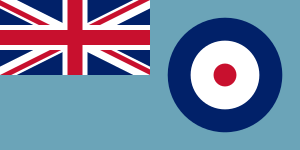No. 519 Squadron RAF
No. 519 Squadron RAF was a meteorological squadron of the Royal Air Force during the Second World War.
| No. 519 Squadron RAF | |
|---|---|
| Active | 15 August 1943 – 31 May 1946 |
| Country | |
| Branch | |
| Type | Inactive |
| Role | Meteorological |
| Part of | No. 18 Group RAF, Coastal Command[1] |
| Motto(s) | Undaunted by Weather[2] |
| Insignia | |
| Squadron Badge heraldry | A polar bear's gamb erased in bend holding a scroll of parchment in front of a flash of lightning[2] |
| Squadron codes | Z9 (Aug 1943 - May 1946)[3][4] |
History
No. 519 Squadron was formed on 15 August 1943[5] at RAF Wick from 1406 Flight,[6] equipped with Handley Page Hampdens and Supermarine Spitfires. Its purpose was collecting meteorological data from the northern waters of the North Sea all the way to Norway. It soon replaced the Hampdens with Lockheed Hudsons and Lockheed Venturas. The squadron base moved on a number of times along the east coast of Scotland but the squadron's role remained the same. In November 1944 the squadron started using the Boeing Fortress, which it operated to the end of the war. With the war over the squadron standardised on the Halifax Mk.III, until it was disbanded at RAF Leuchars on 31 May 1946.[2][5][6]
Aircraft operated
| From | To | Aircraft |
|---|---|---|
| August 1943 | October 1943 | Handley Page Hampden Mk.I |
| August 1943 | January 1945 | Supermarine Spitfire Mk.VI |
| September 1943 | October 1943 | Lockheed Hudson Mks.III and IIIa |
| October 1943 | October 1944 | Lockheed Ventura Mk.V |
| July 1944 | March 1945 | Lockheed Hudson Mks.III and IIIa |
| November 1944 | September 1945 | Boeing Fortress Mk.II |
| October 1944 | December 1945 | Supermarine Spitfire Mk.VII |
| August 1945 | May 1946 | Handley Page Halifax Mks III and VI |
Squadron bases
| From | To | Base |
|---|---|---|
| 15 August 1943 | 11 December 1943 | RAF Wick, Caithness, Scotland |
| 11 December 1943 | 29 November 1944 | RAF Skitten, Caithness, Scotland |
| 29 November 1944 | 17 August 1945 | RAF Wick, Caithness, Scotland |
| 17 August 1945 | 8 November 1945 | RAF Tain, Ross and Cromarty, Scotland |
| 8 November 1945 | 31 May 1946 | RAF Leuchars, Fife, Scotland |
References
- Notes
- Delve 1994, pp. 64, 72, 80.
- Halley 1988, p. 398.
- Bowyer and Rawlings 1979, p. 123.
- Flintham and Thomas 2003, p. 123.
- Jefford 2001, p. 97.
- Rawlings 1982, p. 253.
- Bibliography
- Bowyer, Michael J.F. and John D.R. Rawlings. Squadron Codes, 1937-56. Cambridge, UK: Patrick Stephens Ltd., 1979. ISBN 0-85059-364-6.
- Delve, Ken. The Source Book of the RAF. Shrewsbury, Shropshire, UK: Airlife Publishing, 1994. ISBN 1-85310-451-5.
- Flintham, Vic and Andrew Thomas. Combat Codes: A full explanation and listing of British, Commonwealth and Allied air force unit codes since 1938. Shrewsbury, Shropshire, UK: Airlife Publishing Ltd., 2003. ISBN 1-84037-281-8.
- Halley, James J. The Squadrons of the Royal Air Force & Commonwealth, 1918-88. Tonbridge, Kent, UK: Air-Britain (Historians) Ltd., 1988. ISBN 0-85130-164-9.
- Jefford, C.G. RAF Squadrons, a Comprehensive Record of the Movement and Equipment of all RAF Squadrons and their Antecedents since 1912. Shrewsbury, Shropshire, UK: Airlife Publishing, 2001. ISBN 1-84037-141-2.
- Rawlings, John D.R. Coastal, Support and Special Squadrons of the RAF and their Aircraft. London: Jane's Publishing Company Ltd., 1982. ISBN 0-7106-0187-5.
External links
| Wikimedia Commons has media related to Royal Air Force. |
